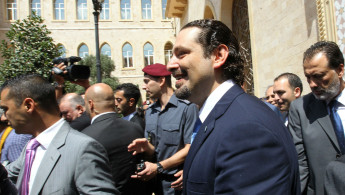Inside the political chasm paralysing Lebanese politics
A dialogue of sorts has been taking place between Lebanon's two main rival political parties, Saad al-Hariri's Future Movement and Hizballah.
This time, however, there was no need for security arrangements, neutral locations, or mediators. This dialogue has been in public, through speeches, statements and counter-statements.
By sheer coincidence, the two sides had major political occasions to commemorate in mid-February: The tenth anniversary of the assassination of the Future Movement's founder, Saad al-Hariri's father, Rafik Hariri, on February 14 - and Martyred Leaders Day, on February 16, on which day Hizballah commemorates the assassination of its former secretary-general, Abbas al-Musawi, commander Imad Mughniyeh, and Ragheb Harb, one of its founders.
| Hizballah fighting Islamic State in Iraq. Read more. |
The occasions were opportunities for both sides to clearly state their positions as they began their very public dialogue.
| To those calling on us to withdraw from Syria we say, let us go together to Syria, Iraq, and anywhere there is terrorism, to confront this threat. - Hassan Nasrallah |
The leader of the Future Movement, Saad Hariri, who returned to Beirut after a long absence, made an appearance on Saturday.
"Dialogue is not a luxury," he told supporters. "It is a necessity for containing intra-Islamic tension, and a national necessity to resolve the problem of a [political] vacuum."
On the other side of the divide, Hizballah Secretary-General Hassan Nasrallah said it was important to continue the dialogue, which had produced what he described as positive results, and hoped a positive outcome could be achieved.
Both men's statements suggest they are keen on continuing talks, even if they do not ultimately produce major results or serious solutions to a crisis that has continued for nearly a decade.
Confronting terrorism
Hariri expressed all of his concerns, observations, and grievances concerning Hizballah in the past ten years. He begin with Hizballah's military intervention in Syria, mentioning the armed militias supported by Hizballah such as the Resistance Brigades, and its obstruction of the work of the Special Tribunal for Lebanon investigating his father's assassination.
Nasrallah's response was direct. "To those calling on us to withdraw from Syria we say, let us go together to Syria, Iraq, and anywhere there is terrorism, to confront this threat."
The two men agreed that the need to fight "terrorism" was an additional issue their dialogue should address, but they interpreted this issue differently.
While Hariri stressed the Lebanese army and state should handle the fight, Nasrallah called for a "common" anti-terrorism strategy. In other words, there was a dispute even on this issue, which many supposed would be common ground, given that radical groups threaten states and populations alike from Iraq and Syria to Yemen.
Another important contentious issue has to do with the fact that Nasrallah labels all Syrian armed groups fighting the regime as "extremists". Nasrallah called on supporters of the Syrian uprising to explain the difference between the Islamic State group (IS, formerly known as Isis) and the Nusra Front, and why the first could be designated a "terrorist" group while Nusra was a "rebel" group.
This is a clear response to some Future Movement officials who refuse to label the Nusra Front a terrorist group.
Mandatory de-escalation
There is no internal or external issue upon which Hizballah and the Future Movement substantially agree.
The two sides may agree on certain ideas, yet dispute the details and even the meaning of those ideas, which is exactly what happened over the presidency - as Lebanon has failed to elect a president in the more than nine months since the term of the last president expired.
Hariri has called on Hizballah to stop obstructing presidential elections because of what he called "political stubbornness", referring to Hizballah's ally MP Michel Aoun, who insists on his controversial candidacy for the presidency.
Nasrallah, meanwhile, called on his political opponents "not to wait for changes in the region and beyond, and to resume internal efforts to resolve the issue".
| Hariri called on Hizballah to stop obstructing presidential elections because of what he called 'political stubbornness'. |
There are many similar disputes, such as Hariri's accusation of Hizballah of intervening in Iraqi affairs, while Hizballah argues this was done in the context of confronting terrorism. These disputes are not likely to stop until the two sides' regional allies prioritise reconciliation in Lebanon.
At the moment, coexistence between the Future Movement and Hizballah seems impossible. However, the two sides find it necessary to continue dialogue for the moment, not least because they both need to limit their domestic losses.
The Future Movement cannot confront Hizballah in Lebanon, militarily, politically or even constitutionally.
Hizballah, meanwhile, does not want to start another battle that might threaten its political or popular base. Hizballah has more than enough on its plate in Syria and Iraq, where Nasrallah recently admitted his party's forces are fighting.
Furthermore, Hizballah's participation in dialogue with its political opponents from another sect helps sell it to the West as a party capable of both confronting terrorism and cooperating with "moderate Islam" at the same time.
Hizballah is looking for cover for its war in support of the regime in Syria, to allow it to claim it is fighting terrorism, as it seems the party is unable to continue this battle alone.
This is an edited translation from our Arabic edition.



